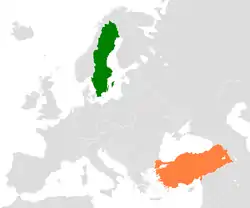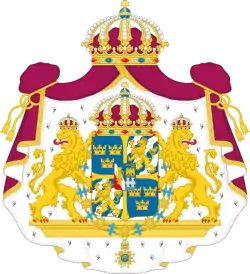Sweden–Turkey relations
Swedish–Turkish relations are foreign relations between Sweden and Turkey.
 | |
Sweden |
Turkey |
|---|---|
Sweden has an embassy in Ankara and a consulate–general in Istanbul. Turkey has an embassy in Stockholm.
History
.jpg.webp)
Both countries are full members of the Council of Europe, the Organisation for Economic Co-operation and Development (OECD), the Organization for Security and Co-operation in Europe (OSCE) and the Union for the Mediterranean.
When Sweden took over the rotating presidency of the Presidency of the Council of the European Union in 2009, the then Swedish prime minister Fredrik Reinfeldt announced his support of Turkey's European Union membership.[1] Sweden's Green Party has criticized France and Germany's opposition to Turkey's membership.[2][3]
Diyanet controlled mosques in Sweden
According to Dagens Nyheter in 2017, nine mosques in Sweden have imams sent and paid for by the Turkish Directorate of Religious Affairs (Diyanet). Along with their religious duties, the imams are also tasked with reporting on critics of theTurkish government. According to Dagens Nyheter, propaganda for president Erdogan is openly presented in the mosques.[4]
Armenian Genocide dispute
On 12 June 2008, the Riksdag refused to refer to the 1915 events of the Armenian Genocide as actual genocide.[5] However, on 11 March 2010, the Riksdag eventually voted for a resolution recognizing the Armenian Genocide.[6]
There was a majority of one vote, with a total of 131 in favour, 130 against, and 88 absent.[7][8][9] Turkey promptly recalled its ambassador to Sweden and cancelled talks that were intended to happen between the two countries on March 17, 2010.[10][11]
Turkish Prime Minister Recep Tayyip Erdoğan responded by issuing a statement saying "We strongly condemn this resolution, which is made for political calculations. It does not correspond to the close friendship of our two nations".[11] Turkey's ambassador to Sweden Zergun Koruturk said on Aktuellt that there would be "drastic effects" of a long-term nature on relations between the two countries, saying "I am very disappointed. Unfortunately, parliamentarians were thinking that they were rather historians than parliamentarians, and it's very, very unfortunate".[9] Swedish Foreign Minister Carl Bildt blogged from Copenhagen that he "regretted" the outcome of the vote.[8]
See also
References
- "Turkey Has Friends in EU, Swedish Prime Minister Fredrik Reinfeldt". Turkish Weekly. 21 April 2009. Archived from the original on 5 August 2009. Retrieved 2009-05-22.
- "Sweden's Greens: Opposition to Turkey due to Islamophobia". Today's Zaman. 11 May 2009. Archived from the original on May 28, 2009. Retrieved 2009-05-22.
- "German, French Leaders Oppose Turkey Joining EU". The Wall Street Journal. Archived from the original on May 14, 2009. Retrieved 2009-05-22.
- "Genom statsanställda imamer har Turkiet inflytande i nio svenska moskéer. Många turksvenskar i Stockholm, Göteborg och Malmö har slutat gå till moskén av rädsla. Den alltmer auktoritära turkiska regimen skrämmer och kartlägger meningsmotståndare i Sverige". DN.SE (in Swedish). Dagens Nyheter. 2017-04-01. Archived from the original on 15 June 2018. Retrieved 2019-02-16.
- Swedish Parliament Refuses to Recognize the Armenian Genocide Archived 2011-07-16 at the Wayback Machine
- https://www.google.com/hostednews/ap/article/ALeqM5g220vjRf5SSVm5PTU7W4wjC2dUIgD9ECK0NO0
- "Swedish MPs enrage Turkey". Radio Netherlands Worldwide. 11 March 2010. Retrieved 11 March 2010.
- "Turkey outraged as Sweden labels Armenian massacre 'genocide'". Deutsche Welle. 11 March 2010. Retrieved 11 March 2010.
- "Turkey recalls envoy to Sweden over Armenia vote". Reuters. 11 March 2010. Retrieved 11 March 2010.
- "Déjà Vu? Turkey Recalls Ambassador to Sweden". Armenian Weekly. 11 March 2010. Retrieved 11 March 2010.
- "Sweden angers Turkey with Armenian vote". RTÉ. 11 March 2010. Retrieved 11 March 2010.
